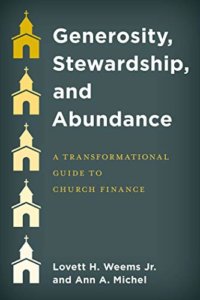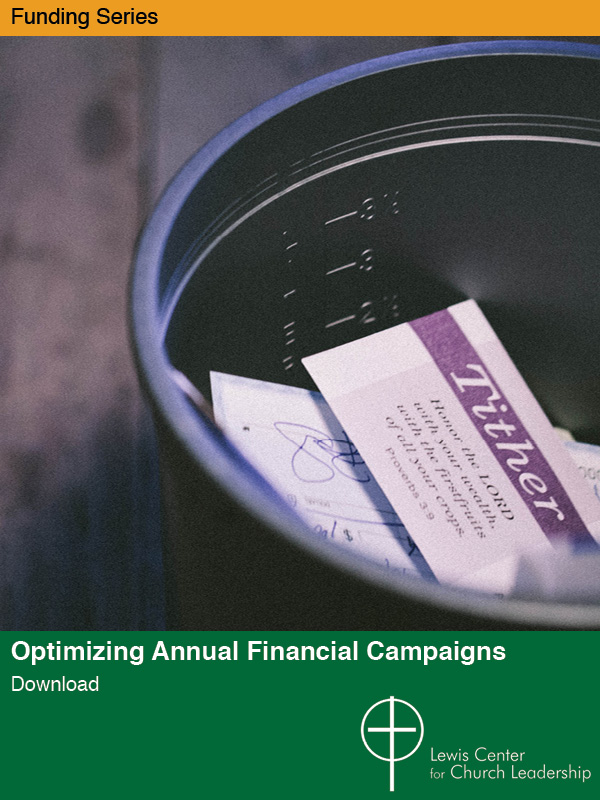Ann Michel of the Lewis Center staff writes that churches can promote financial transparency and enhance generosity by addressing the often-taboo subject of money more openly and faithfully. She offers seven practical strategies to improve the tone of your conversation around money and giving.
Some congregations are so close-lipped when discussing money and giving that members might think the Christian faith requires silence on the subject. Yet nothing could be further from the truth. Jesus talked about money more than any subject other than the kingdom of God. And how we live in relation to money and possessions is a deeply spiritual matter at the heart of Christian discipleship. Christians can and should talk about money!
Why, then, is money such a taboo subject? In American culture, no subject is more private than income and finances because money defines our power and worth and no one wants to be disclosed as lacking either. Unfortunately, this cultural attitude has seeped into the church creating a conspiracy of silence. Clergy and other leaders don’t feel comfortable talking about money, and that’s just fine with church members because they don’t want to hear about it.
How can churches begin to pierce this veil of secrecy and move toward greater transparency and accountability regarding money and finances? Adhering to the following practices can improve your conversations about giving and stewardship.
1. Don’t limit money talk to stewardship season.
Because of our cultural aversion to talking about money, many pastors avoid preaching on the subject except on that ONE Sunday when they hold their nose and steel themselves to deliver THE dreaded annual stewardship sermon. Talking about money only when we need to ask for it is self-defeating. Congregants learn to tune out this sermon because they perceive it for what it is — a fundraising pitch. Preachers should strive to integrate stewardship themes into their preaching throughout the year — not just when the stated subject is money, but when the subjects of generosity and living in right relationship with money and possessions relate to other spiritual messages.
2. Address people’s financial reality not just the church’s needs.
When the subject of money does come up, it typically centers around the congregation’s financial needs and concerns. Rarely do churches address the financial reality of members, who may be burdened with student or consumer debt, struggling with medical expenses, or inadequately prepared for retirement. A ministry of financial literacy can spur a larger conversation about faith and finances while also providing much-needed pastoral care and financial guidance to members.
3. Focus on the spiritual significance of money.
Why does money talk in churches center so often around budgets, bills, and balance sheets? Doesn’t our faith teach that money is an instrument of God’s mission? We’re stuck in what sociologists Christian Smith and Michael Emerson call a “pay the bills” mentality as opposed to a “live the vision” mindset. Lovett Weems suggests two simple principles that can move a church in the right direction. Never talk about people’s money apart from their discipleship and never talk about the church’s money apart from its mission.
4. Share stories.
Inviting people to speak from the heart about their personal history with money and giving can begin to pierce the veil of secrecy around money. This sharing should be done in thoughtful and appropriate ways, of course. But testimonies can be offered in worship, small groups, and even online. Pastors and other key leaders can model the way by sharing their own stories around personal stewardship and generosity.
5. Lead with generosity, rather than stewardship.
Church conversations around money and giving often rely heavily on the vocabulary of stewardship and tithing. Stewardship and tithing are, of course, important theological concepts; unfortunately, fewer and fewer people today grasp the deeper meaning of these terms. They are often heard merely as euphemisms for fundraising or finger-wagging legalisms. The vocabulary of gratitude and generosity can be a more gracious and inviting way to begin the conversation and one that is equally faithful and biblical. I’m not suggesting we abandon the concepts of stewardship and tithing. But our faith tells a wonderful, hopeful, inspiring story of a generous God who calls us to be generous. This is simple, relatable language to start talking about what God has given us and the importance of giving back in return.
6. Stay positive.
How many times have you heard messages like these? “If we can’t close our budget gap, we may need to fire the organist and suspend children’s Sunday school.” Or “This church is only two years from closing if everyone doesn’t ante up.” This approach is not only depressing, it’s self-defeating. Trying to motivate giving through scare tactics signals that your ministry is struggling, and few people are motivated to invest in something that’s spiraling downward. Appeals to guilt or obligation motivate few, if any, people, so it’s important to keep a positive tone. Our faith is one of abundance, not scarcity. It teaches that giving is a joy not an obligation. We need to lean into these narratives.
7. Say thank you.
Some churches are quite persistent in asking for money but neglect two other interrelated forms of communication — thanking people and telling the story of what giving makes possible. Talking about money in a more balanced way involves an ongoing cycle of communication that always begins with thanking people for what they have already done. Gratitude and generosity are two sides of the same coin. Developing the instinct to begin always with “thank you” can significantly improve the tone of your conversations around money and reinforce generosity, as well.
One of a spiritual leader’s most important roles is helping others see money and giving through the lens of faith. Effective pastors and church leaders learn to speak about money more frequently, frankly, and faithfully.
 Ann Michel is co-author with Lovett H. Weems, Jr., of Generosity, Stewardship, and Abundance: A Transformational Guide to Church Finance (Rowman and Littlefield, 2021).
Ann Michel is co-author with Lovett H. Weems, Jr., of Generosity, Stewardship, and Abundance: A Transformational Guide to Church Finance (Rowman and Littlefield, 2021).
Related Resources
- Theology of Stewardship and Biblical Generosity Video Tool Kit
- Changing the Tone of Conversations about Money and Church by Lovett H. Weems, Jr.
- 5 Habits Your Church Must Unlearn to Increase Giving by Matt Miofsky And Jason Byassee






